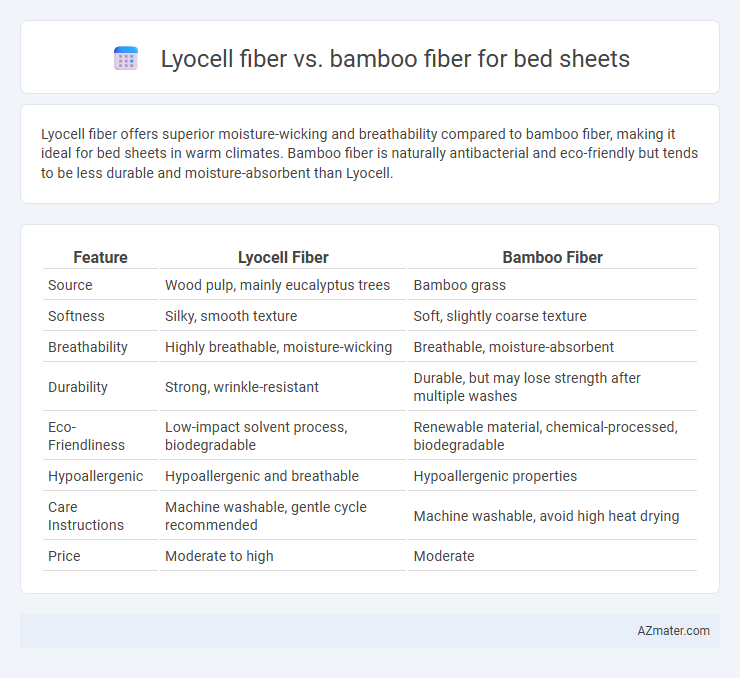Lyocell fiber offers superior moisture-wicking and breathability compared to bamboo fiber, making it ideal for bed sheets in warm climates. Bamboo fiber is naturally antibacterial and eco-friendly but tends to be less durable and moisture-absorbent than Lyocell.
Table of Comparison
| Feature | Lyocell Fiber | Bamboo Fiber |
|---|---|---|
| Source | Wood pulp, mainly eucalyptus trees | Bamboo grass |
| Softness | Silky, smooth texture | Soft, slightly coarse texture |
| Breathability | Highly breathable, moisture-wicking | Breathable, moisture-absorbent |
| Durability | Strong, wrinkle-resistant | Durable, but may lose strength after multiple washes |
| Eco-Friendliness | Low-impact solvent process, biodegradable | Renewable material, chemical-processed, biodegradable |
| Hypoallergenic | Hypoallergenic and breathable | Hypoallergenic properties |
| Care Instructions | Machine washable, gentle cycle recommended | Machine washable, avoid high heat drying |
| Price | Moderate to high | Moderate |
Introduction to Lyocell and Bamboo Fibers
Lyocell fiber, derived from sustainably harvested eucalyptus trees, features a closed-loop production process minimizing environmental impact, while bamboo fiber is made from bamboo pulp processed into viscose, offering natural antibacterial properties. Both fibers are celebrated for their softness, breathability, and moisture-wicking abilities, ideal for luxurious and comfortable bed sheets. Lyocell tends to be stronger and more eco-friendly due to its closed-loop manufacturing, whereas bamboo fiber is prized for its durability and natural resistance to odors.
Source Materials: Lyocell vs Bamboo
Lyocell fibers are derived from sustainably sourced hardwood trees such as eucalyptus, beech, and spruce, processed through an eco-friendly closed-loop method that recycles almost all chemicals and water. Bamboo fibers used in bed sheets are typically made from bamboo pulp, but they often undergo chemical-intensive processing to convert the cellulose into viscose or rayon, which affects the environmental footprint. Choosing Lyocell over bamboo viscose ensures a more sustainable and cleaner production process, preserving both fiber quality and eco-responsibility.
Manufacturing Process Comparison
Lyocell fiber is produced through a closed-loop process using wood pulp, typically from eucalyptus trees, which is dissolved with non-toxic solvents and recycled, making it eco-friendly and sustainable. Bamboo fiber manufacturing involves mechanical crushing and enzymatic treatment or chemical processing to extract fibers, often requiring harsher chemicals and generating more waste compared to Lyocell. The closed-loop solvent recovery system in Lyocell production ensures minimal environmental impact, whereas bamboo fiber processing can vary significantly in sustainability depending on the method used.
Sustainability and Environmental Impact
Lyocell fiber derived from sustainably managed eucalyptus forests requires less water and energy during production compared to bamboo fiber, which often involves chemically intensive processing despite bamboo's rapid growth. Both fibers are biodegradable, but Lyocell's closed-loop production system recovers solvents, drastically reducing environmental pollution. Bamboo's cultivation benefits from minimal pesticide use, yet its chemical treatment process frequently raises concerns over ecological toxicity and carbon footprint in bed sheet manufacturing.
Texture and Feel: Comfort Differences
Lyocell fiber bed sheets offer a smooth, silky texture with excellent moisture-wicking properties, providing a cool and breathable feel ideal for sensitive skin. Bamboo fiber sheets tend to have a slightly softer, more plush texture with natural antibacterial qualities, enhancing comfort in humid conditions. Both fibers excel in softness and breathability, but Lyocell delivers a crisper, cooler sensation while bamboo sheets feel more cushioned and cozy.
Breathability and Moisture-Wicking Properties
Lyocell fiber exhibits superior breathability due to its smooth, porous structure, allowing efficient air circulation and temperature regulation in bed sheets. Bamboo fiber, known for its excellent moisture-wicking capabilities, rapidly absorbs and releases moisture, keeping sleepers dry and comfortable throughout the night. Compared to bamboo, Lyocell offers enhanced moisture management combined with a cooler feel, making it ideal for hot sleepers seeking breathable, moisture-wicking bedding.
Durability and Longevity in Bed Sheets
Lyocell fiber offers superior durability and longevity in bed sheets due to its strong, cellulose-based structure that resists pilling and maintains integrity after multiple washes. Bamboo fiber, while naturally antimicrobial and breathable, tends to be softer but less resilient, often showing signs of wear and weakening faster over time. Choosing Lyocell bed sheets ensures extended lifespan and sustained quality, making them a more durable option compared to bamboo fiber sheets.
Hypoallergenic Qualities and Skin Sensitivity
Lyocell fiber, derived from sustainably sourced eucalyptus trees, offers superior hypoallergenic qualities due to its natural resistance to dust mites and mold, making it ideal for sensitive skin and allergy sufferers. Bamboo fiber, while also hypoallergenic and naturally antibacterial, may retain more moisture, which can potentially irritate extremely sensitive skin if not properly processed. The smooth, breathable structure of Lyocell enhances moisture-wicking and reduces skin irritation, outperforming bamboo fiber in maintaining skin comfort during sleep.
Price Range and Value for Money
Lyocell fibers generally fall within a mid-to-high price range, offering excellent moisture-wicking and breathability, which enhances comfort and durability in bed sheets. Bamboo fibers tend to be more affordable, providing natural antibacterial properties and softness, but may wear faster with repeated washing. Consumers seeking long-lasting, high-performance bedding often find Lyocell to offer better value for money despite the higher initial cost.
Which Fiber is Best for Your Bed Sheets?
Lyocell fiber offers superior moisture-wicking and breathability, making it ideal for those seeking cool and comfortable bed sheets. Bamboo fiber excels in natural antibacterial properties and sustainability, providing a hypoallergenic option that is gentle on sensitive skin. Choosing between them depends on whether you prioritize eco-friendly durability and softness (Lyocell) or antibacterial benefits and allergen resistance (Bamboo).

Infographic: Lyocell fiber vs Bamboo fiber for Bed sheet
 azmater.com
azmater.com